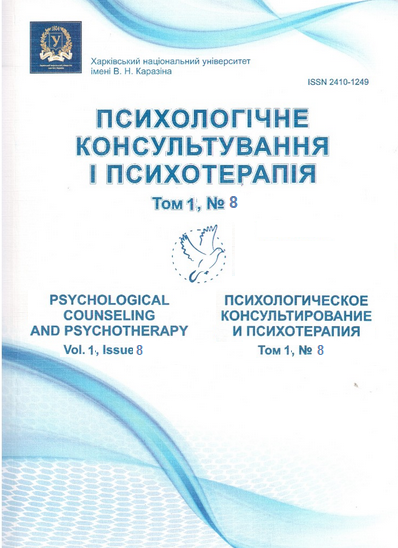Personal determinants of life style: psychological valeology
Abstract
Personal determinants of life style are examined in psychotherapeutic discourse. Several ideas are determined 1) in culture the value of “maturity” is lost, the normative approach is replaced by tolerance; 2) rising and expanding of two phenomena is observed: devaluation of the adulthood and total infantilisation; 3) the difficulties in articulation of general desirability of the life style: some factors of life style development that cannot explain the formation of the effective style are examined. In the article the topological model of the psychological field is presented, the concept of "emotional scheme" and its structure are defined, namely: experiences, physical manifestations, system of early memories, person’s interpretation of his or her life, motivational tendencies. It is not possible to change the life style without changing the emotional scheme and all its components. The clinical observation regarding the formation of a life style based on a fixed emotional scheme is presented. The connection of all components of the emotional scheme with some types of life style such as "active activity", "active serving", "passive serving", "strangeness", "suffering" is provided in the article. In addition, the connection between the emotional scheme and the characterological styles is analyzed. The fixed and specific for a type of character of the experience and experiences of the primary "block" are not identical: they are in terms of the ontological "objectivity" and the phenomenological perspective. The perspective of further research is the clarification of the relationship between, on the one hand, the concepts of "characterological style" and "emotional scheme", and, on the other hand, "characterologically relevant emotion" and the primary "blocked" experience.
Downloads
References
Szasz Th. The Myth of mental illness. N.Y.: New York University, 1971
Руднев В.П. Миф психотерапии // Психология. Журнал Высшей школы экономики. 2006, Т.3, №1. – С. 97-102.
"Жизнь без вещей": Часть 2. Как отказаться от лишнего? Режим доступа: http://nikkori.livejournal.com/118754.html.
Как нас теперь называть. Электронный ресурс. Режим доступа: http:// www.change-ager.com.
CESNUR — Center for Studies on New Religions: Le religioni in Italia — L’Ontopsicologia; Massimo Introvigne, PierLuigi Zoccatelli (sotto la direzione di) Le religioni in Italia, Elledici — Velar, Leumann (Torino) — Gorle (Bergamo), 2006, pp. 1.152 цит. По: Онтопсихология. Электронный ресурс. Режим доступа: https://ru.wikipedia.or.
Kunzmann, U., & Baltes, P. B. (2005). The Psychology of Wisdom: Theoretical and Empirical Challenges. In R. J. Sternberg & J. Jordan (Eds.), A handbook of wisdom: Psychological perspectives (pp. 110-135).
Sternberg: A Wayward Path to Wisdom. Электронный ресурс. Режим доступа: https://www.psychologytoday.com/articles/199805/sternberg-wayward-path-wisdom.
Селигман М. Путь к процветанию. Новое понимание счастья и благополучия. – М.: Манн, Иванов и Фербер, 2011.
Радость. Электронный ресурс. Режим доступа: https://azbyka.ru/radost.
Кочарян И.А. Система радости: эссенциальная саморегуляция психики и ее психологическая коррекция. – Харьков: Изд-во Харьковского национального университета имени В.Н. Каразина, 2016. 288 с.
Эволюция ценностей: Теория Грэйвса и Спиральная динамика. Электронный ресурс. Режим доступа: http://nlping.ru/432CBFC3-F44FD-314CDA54.
Холл К. С., Линдсей Г. Теории личности. – М.: Психотерапия. – 2008. – 656 с.
Ницшке Б. Значение сексуальности в трудах Зигмунда Фрейда / Б. Ницшке // Энциклопедия глубинной психологии. З. Фрейд. Жизнь, работа, наследие / З. Фрейд. – М.: Издательство: Interna, Менеджмент, 1998. – Т. 1. – С. 365–406.
Кочарян А.С. Переживание как мишень психотерапии // Психотерапия как невербальная практика. – Харьков: Изд-во Харькоувского университета, 2014. – С. 17-29.
Robert E., Greenber L. Emotion-focused therapy // The Person-Centred Counselling and Psychotherapy Handbook: Origins, Developments and Current Applications: L.: UK Higher Education Humanities & Social Sciences Counselling, 2016. – P. 213-222.
Elliott R. Emotion-focused therapy // The Tribes of the Person-centred Nation: A Guide to the Schools of Therapy Associated with the Person-centred Approach. PCCS Book, 2004. – P. 103 – 130.
Kocharian O.S., Barinova N.V. The “process” in experientially model of client-centered therapy // American Journal of Fundamental, Applied & Experimental Research. – 2017. – P. 46-52.
Роджерс К. Взгляд на психотерапию. Становление человека / Общ. ред. и предисл. Исениной Е.И. Пер. с англ. – М.: Издательская группа «Прогресс», Универс», 1994. – 480 с.
Электронный ресурс. ФБ. Андрей Ермошин. 1 февраля 7:32.
Goldman Rh., Watson J. Emotion-Focused Therapy // Person-centred and experiential therapies. Ed. by P. Wilkins. – London: Sage, 2016. p. 77-88.
Карягина Т.Д. Экспириентальные подходы в современной психотерапии // Консультативная психология и психотерапия. – 2015, №1. - с. 126 – 150.
Шапиро Д. «Невротические стили» / Пер. с англ. К.В. Айгон — М.: Институт Общегуманитарных Исследований, Серия Современная психология: теория и практика, 2000 г.
Джонсон С. Психотерапия характера. Практическое руководство. М.: Центр психологической культуры, 2001. – 169 с.








